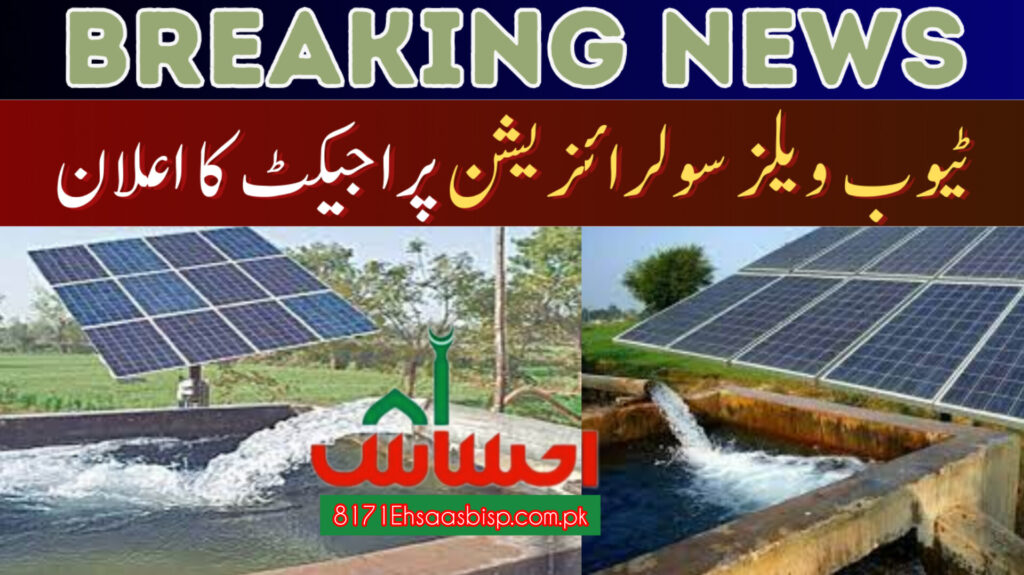
Introduction
In a significant move toward sustainable energy and agricultural advancement, the Punjab government has unveiled the Agriculture Tube Wells Solarization Project. This groundbreaking initiative aims to transform the agricultural sector by switching the power source for tube wells from conventional electricity methods to solar energy. The project promises numerous benefits, including reducing the carbon footprint, cutting down energy costs for farmers, and enhancing the reliability of the water supply for irrigation.
Project Overview
The Agriculture Tube Wells Solarization Project involves installing solar panels to power tube wells across Punjab’s extensive agricultural regions. This initiative is a crucial component of the state’s broader strategy to expand renewable energy use and support farmers by reducing their dependence on traditional electricity and diesel-powered pumps.
Objectives and Goals
Promoting Renewable Energy
Transitioning to solar power aligns with global and national objectives to increase the share of renewable energy in the overall energy mix. This shift not only supports sustainable practices but also helps in meeting environmental targets.
Reducing Energy Costs
Solar-powered tube wells will significantly lower operational costs for farmers, providing financial relief and enhancing their profitability. This economic advantage is vital for the sustainability of the agricultural sector.
Ensuring Reliable Water Supply
Solar energy offers a consistent and reliable power source, ensuring uninterrupted water supply for irrigation, even during power outages. This reliability is crucial for maintaining crop yields and agricultural productivity.
Environmental and Economic Benefits
Environmental Impact
Switching to solar power for tube wells is expected to have a profoundly positive impact on the environment. Key benefits include:
- Reduction in Greenhouse Gas Emissions: Replacing diesel and grid electricity with solar power will substantially cut greenhouse gas emissions, contributing to climate change mitigation efforts.
- Conservation of Fossil Fuels: Utilizing solar energy reduces reliance on fossil fuels, promoting sustainable energy practices and conserving natural resources.

Economic Advantages
The economic benefits of the project are extensive:
- Cost Savings for Farmers: The high cost of electricity and diesel is a major burden for farmers. Solar energy provides a cost-effective alternative, reducing operational expenses and increasing farmers’ net income.
- Job Creation: The installation and maintenance of solar panels will generate job opportunities in the renewable energy sector, boosting local economies.
Implementation Strategy
Phased Approach
The project will be implemented in phases to ensure effective management and execution:
- Pilot Phase: A pilot phase will be conducted to assess feasibility and address potential challenges. Selected areas with high solar potential will be targeted initially.
- Scaling Up: Based on the success of the pilot phase, the project will be expanded to cover more areas across Punjab, aiming to solarize thousands of tube wells over the next few years.
Financial Models
The government has proposed various financial models to facilitate the adoption of solar technology:
- Subsidies and Incentives: The state government will provide subsidies and financial incentives to farmers for installing solar panels, reducing upfront costs.
- Public-Private Partnerships: Collaborations with private companies will be encouraged to leverage their expertise and investment capabilities, ensuring the project’s sustainability and scalability.
- see also
- Breaking News: How to Apply for the Agriculture Internship Program: A Detailed Guide 2024
- Exclusive Updates: Punjab Government Announces Major Recruitment Drive for 30,000 Teachers 2024
- Breaking News: Sindh Textbook Board Launches Ambitious Tablet Distribution Initiative for Students 2024
- ASF Jobs Apply Before August 25, 2024 – Complete Guide
- Exclusive News: Huawei Train the Trainer Program: A Groundbreaking Initiative for Pakistani Students in 2024
Community and Stakeholder Engagement
Farmer Involvement
Active participation of farmers is crucial for the project’s success. The government plans to:
- Conduct Awareness Campaigns: Educational campaigns will be launched to inform farmers about the benefits of solar energy and the specifics of the project.
- Training Programs: Training sessions will be organized to equip farmers with the necessary skills to operate and maintain solar-powered tube wells.
Collaboration with Experts
The project will involve collaboration with experts in renewable energy, agriculture, and environmental conservation to ensure best practices and innovative solutions are implemented.
Frequently Asked Questions (FAQs)
Q1: What is the Agriculture Tube Wells Solarization Project?
A1: The Agriculture Tube Wells Solarization Project is a Punjab government initiative aimed at converting the power source for agricultural tube wells from traditional energy systems to solar energy. This initiative is designed to promote renewable energy use and reduce operational costs for farmers.
Q2: How will the project benefit farmers?
A2: Farmers will benefit from the project through reduced energy costs, more reliable water supply for irrigation, and increased profitability. By cutting down on operational expenses and providing a stable power source, the project is expected to enhance the financial stability of farmers.
Q3: What are the environmental benefits of this project?
A3: The project will contribute to significant environmental improvements by reducing greenhouse gas emissions and conserving fossil fuels. By replacing diesel and grid electricity with solar power, it will support efforts to combat climate change and encourage sustainable energy practices.
Q4: How will the project be implemented?
A4: The project will be rolled out in phases, starting with a pilot phase to evaluate its feasibility and address any issues. Following this, it will be expanded to additional regions. The adoption of the project will be supported by financial models, including subsidies and public-private partnerships.
Q5: What financial support will be provided to farmers?
A5: Farmers will receive financial support through government subsidies and incentives to help offset the initial costs of installing solar panels. Additionally, the project will promote favorable financing options and public-private partnerships to ensure its long-term sustainability.
Conclusion
The Agriculture Tube Wells Solarization Project represents a transformative step toward sustainable energy and agricultural development in Punjab. By harnessing the power of the sun, the project aims to provide economic relief to farmers, reduce environmental impact, and ensure a reliable water supply for irrigation. Through strategic implementation, financial support, and active community engagement, Punjab is set to lead the way in integrating renewable energy into its agricultural sector.
